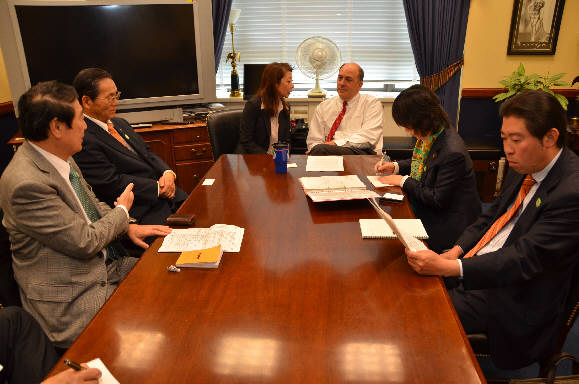
The delegation of National Conference to Consider the TPP from Japan exchanges opinions with officials of the U.S. government, Congress and industries in Washington.
Part 1; Scrapping tariffs across the board
Takanori Okabe
In late April, a delegation of National Conference to Consider the TPP, a group of experts and lawmakers who are against Japan’s entry into the Trans-Pacific Partnership free-trade talks, visited the United States to exchange opinions with officials of the U.S. government, Congress and industries concerning the TPP talks. Takanori Okabe of The Japan Agricultural News, who accompanied the delegation, reports on the U.S.’ real intention which surfaced during the visit, including their opposition to allowing exceptions in scrapping tariffs, and on the differences between the recognitions of Japan and the U.S.
In the TPP negotiations, there is a basic principle that all goods are subject to tariff elimination. The agriculture, forestry and fisheries committees of both houses of the Diet and the Liberal Democratic Party each adopted a resolution requesting that key agricultural products be considered “sanctuaries,” asking that the products be exempted from tariff abolition or be set aside for future negotiations. Through the visit, however, no assurances or support were given on this issue.
In a meeting with the delegation, Assistant U.S. Trade Representative Wendy Cutler acknowledged that each country has its sensitivities such as certain agricultural products for Japan, but said that exemption from tariff elimination is not the only way to treat them. There are alternatives such as phasing out of tariffs and safeguards, Cutler said, stressing the U.S. government’s stance of demanding tariff elimination of all goods in the TPP negotiations. When former agriculture, forestry and fisheries minister Masahiko Yamada, vice head of the delegation, asked whether it means the U.S. does not accept any exceptions, Cutler said that the participating countries as well as Japan have promised to work on achieving a comprehensive and high-standard agreement.
U.S. congressmen and agricultural groups shared the same recognition of rejecting any exceptions. An assistant to Republican Congressman Dave Camp, chairman of the House Committee on Ways and Means which has jurisdiction over trade policies, firmly stated that nothing should be excepted in the TPP negotiations. Camp is a representative from Michigan with a thriving auto industry, but the assistant said the U.S. does not intend to exempt even automobiles from tariff elimination, urging Japan to make all goods subject to tariff cuts.
An assistant to Sander Levin, the ranking Democrat on the committee, noted that the U.S. also has sensitivities, but that they are treated in terms of setting phase-out periods for tariffs. President Bob Stallman of American Farm Bureau Federation, the U.S.’ largest agricultural lobby group, also said he will call on the U.S. government to ask Japan to abolish tariffs on all goods including sensitive products or reduce tariffs to the level favorable enough for exports from the U.S.
Meanwhile, the resolutions adopted by the committees of both houses of the Diet and the LDP calling for exceptions of sensitive products were hardly recognized in the U.S. When the delegation handed the English version of the resolution, many looked astonished and said they will confirm the USTR on the matter.
(May 11, 2013)

